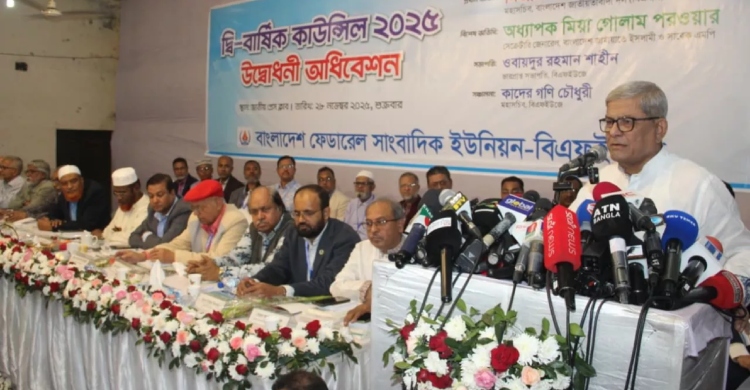Fakhrul urges journalists to strengthen unions, avoid political alignment


BNP Secretary General Mirza Fakhrul Islam Alamgir on Friday urged journalists to strengthen their own unions and move away from becoming aligned with any political party, saying this is the only way to protect their professional rights and ensure true media freedom.
Speaking at the opening session of the biennial council of the Bangladesh Federal Union of Journalists (BFUJ) at the Jatiya Press Club, he also expressed concern that social media are being used to create anarchy in the country and obstruct the democratic transition.
“Golam Parwar (Secretary General of Jamaat-e-Islami) has rightly said that journalists should prioritise their own demands, their own work, and the main responsibility of their unions is to work with the owners or the government on these demands,” Fakhrul said.
He also said aligning with any political party, whether the ruling or the opposition, does not solve journalists’ problems.
“Over the last 15 years, fascism under Sheikh Hasina has completely destroyed that space in the media sector in a planned way. I would request your (journalists’) leaders to try to move away from that position,” the BNP leader said.
He said that if journalists want to establish their rights—whether in employment or other areas—their unions need to become stronger.
“You must stand strong, and you must stand on your own without being involved with any political party. Only then will you be able to secure what you deserve. In other words, you have to carry out the true responsibility of the union with full accountability,” Fakhrul said.
The BNP leader also praised journalists who opposed fascism during the anti-fascist movement.
Representatives of 18 affiliated journalist unions from across the country, including the Dhaka Union of Journalists, took part in the council.
Speaking about the upcoming national election, Fakhrul said the entire nation is waiting for the February polls, hoping to return to a democratic system.
“We all want the election. At the same time, we must remember that if we want to return to democracy, we must also value others’ freedom of expression. There will be unity where unity is needed, but there will also be differences. Democracy means I may not agree with you, but I will defend your right to express your views,” he said.
The BNP leader bemoaned that people in Bangladesh are often treated as enemies for holding different opinions and subjected to “false propaganda”. “I think all of us should refrain from these things,” he added.
Fakhrul said social media has become a serious problem worldwide, including in Bangladesh, because of the lack of accountability.
“Anyone can say anything. Negative campaigns against political leaders, public figures and businesses are being carried out in a way that does not strengthen democracy,” he said.
The BNP Secretary General also said it is unfortunate that such campaigns have created a serious problem in Bangladesh.
“They (social media influencers) are trying to create a kind of anarchy, a sort of chaos. Mob violence is being instigated, false campaigns are being run against people. Individuals are being misrepresented — and without doubt, this is obstructing our democratic journey,” he said.
Fakhrul said BNP has a proven record of supporting press freedom, noting that its founder Ziaur Rahman restored multi-party politics from one-party rule and reopened all newspapers that were closed by Awami League under Baksal.
Later, he said BNP Chairperson Begum Khaleda Zia made every effort necessary to ensure media freedom. He mentioned that in their 31-point programme, they clearly committed to guaranteeing full and independent media freedom.
At the beginning of his speech, Fakhrul sought prayers for BNP Chairperson Khaleda Zia, who is hospitalised with serious health problems.
“Doctors are trying their best. Please, you all pray for her quick recovery,” he said.
Addressing the programme, Jamaat Secretary General Mia Golam Parwar said the biggest strength of journalists in difficult times is unity and keeping it intact.
“There is division within various journalist unions across the country. If we can preserve unity among journalists, we can also play a role in uniting the nation,” he said.
